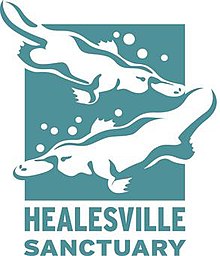| Healesville Sanctuary | |
|---|---|
 | |
 | |
| 37°40′56″S 145°31′54″E / 37.6822°S 145.5316°E | |
| Date opened | 1934 |
| Location | Healesville, Victoria, Australia |
| Land area | 28 acres (11 ha) |
| No. of species | 140+ |
| Website | zoo |
Healesville Sanctuary, formally known as the Sir Colin MacKenzie Sanctuary, is a zoo specialising in native Australian animals. It is located at Healesville in rural Victoria, Australia, and has a history of breeding native animals. It is one of only two places to have successfully bred a platypus, the other being Sydney's Taronga Zoo. It also assists with a breeding population of the endangered helmeted honeyeater.[1]
The zoo is set in a natural bushland environment where paths wind through different habitat areas showcasing wallabies, wombats, dingoes, kangaroos, and over 200 native bird varieties.
Guided tours, bird shows and information areas are available to visitors.
History
Dr Colin MacKenzie (knighted in 1929) set up the Institute of Anatomical Research in 1920 on 78 acres (32 ha) of land formerly part of the Aboriginal reserve known as Coranderrk. The Reserve passed to the Healesville Council in 1927 and became the Sir Colin MacKenzie Sanctuary in 1934.
The first platypus bred in captivity was born in the Sanctuary in 1943 when David Fleay managed it.
The park was placed under the management of the Victorian Zoological Parks and Gardens Board on 27 June 1978.[2]
In 2009, the sanctuary was threatened by the Black Saturday bushfires, and the sanctuary evacuated their threatened species to Melbourne Zoo.[3]
Animals and exhibits
-
Tasmanian devil
-
Lace monitor
-
Helmeted honeyeater (captive bred)
-
Red tailed black cockatoo
|
|
- Koalas Area
- Birds of the bush
- Kangaroos
- Gang-gang Aviary
- World of the Platypus/Platypusary
- Woodland Aviary
|
|
- Rock-wallabies area
- Brush-tailed rock-wallaby
- Australian pelican
- Australian white ibis
- Black swan
- Dusky moorhen
- Magpie goose
- Pacific black duck
- Purple swamphen
- Arid Birds
- Budgerigar
- Diamond firetail
- Gouldian finch
- Painted finch
- Princess parrot
- Rainbow bee-eater
- Scarlet-chested parrot
- Variegated fairy-wren
- Wetlands Aviary
- Wallabies
- Wombat Closeup
- Animals of the Night
|
|
- Land of Parrots Aviary
- Budgerigar
- Eclectus parrot
- Major Mitchell's cockatoo
- Red-tailed black cockatoo
- Australian brush-turkey
- Black-faced cuckoo-shrike
- Brush bronzewing
- Pacific emerald dove
- White-headed pigeon
- Wonga pigeon
- Zebra finch
- Reptile Encounter
|
|
- Lyrebird Forest
|
|
- Larger Wetlands Aviary
|
|
- Flying Foxes Area
See also
References
- ^ Menkhorst P, Smales I, Quin B (2003). "Helmeted Honeyeater Recovery Plan 1999–2003". Australian Government, Department of the Environment and Water Resources. Retrieved 21 June 2007.
- ^ "Governance and policies". www.zoo.org.au. Archived from the original on 11 October 2019.
- ^ Kent, Melissa (6 September 2009). "Fire and flight no turn-off for horny devils". The Age. Melbourne.
External links
 Media related to Healesville Sanctuary at Wikimedia Commons
Media related to Healesville Sanctuary at Wikimedia Commons- Official website












